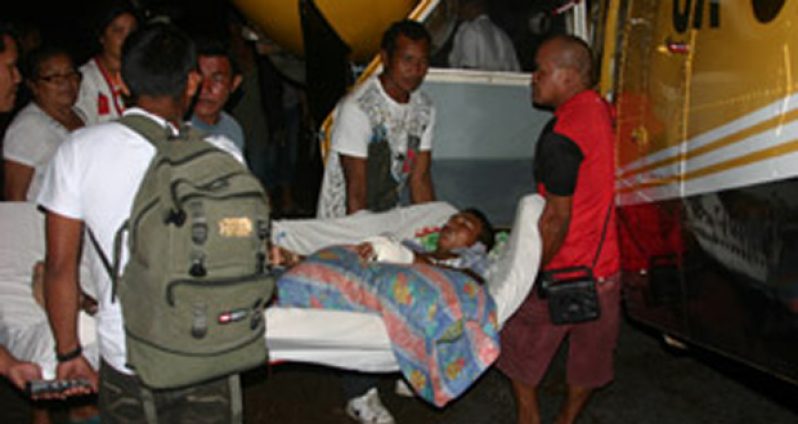–not a reckless operation
By Shauna Jemmott
MEDICAL evacuation (Medivac) takes passion, determination, selflessness and a deep love; a willingness to risk it all.
When a man is most comfortable resting in his bed, and is called out to help a stranger hundreds of miles away, it takes sacrifice to get up. In the midst of getting out, he is walking out on everything he has worked to build and walking into the unknown, unsure of a safe return.
Captain Gerry Gouveia and a fleet of pilots with the Roraima Air Services brand take the risk as often as they receive the call to save a life in the distant hinterland, which lacks adequate access to medical care.
But as much as living for them is necessary, the former Guyana Defence Force (GDF) captain and current Chief Executive Officer (CEO) of Roraima Group of Companies said he has learnt, long ago as a member of the disbanded Guyana National Service (GNS), that it is vital to “put country before self.”
“When I went into National Service, they promised me…. They said that this National Service is going to evolve the new Guyana man; this National Service is going to make people put country before self… And I would say National Service succeeded….
“Throughout my life, my whole philosophy is to give back. Every time we save a person’s life, the normal satisfaction we get from doing it is amazing,” Gouveia told the Guyana Chronicle in an interview.
The GDF taught him everything in medivac operations, he says, and while he was the last of such pilots in the 1980s, he resigned and started private operations, establishing Roraima.
The company’s name has become an inscription into the Ministry of Health’s medivac programme, and into the life stories of thousands saved just “in the nick of time”, as Gouveia puts it.
CONCERNS
“Our search and rescue system is so bad that, if something does happen to our planes, we know that we are also in difficult time because the ability to respond…and get through it if you survive is so limited. They don’t have the kind of helicopters to come and get you if something goes wrong… They need to get the search and rescue system up and running. We need to get security for our runways, both physical security and fencing…the government needs to be able to appoint an airport or an airstrip manager on every runway,” Captain Gouveia said.
While he praised government for installing solar-powered lights on some runways, he is recommending that all of the hinterland runways should receive such lightings, in order to improve the medivac rescue system.
FLAMBEAU CHALLENGE
Runways in the hinterland were, for decades, being lit by flambeau lamps, as the team collaborated with the villages in creating an illuminated landing atmosphere. Twenty of the lamps were placed on each side of the runway to guide pilots. It still happens, and it is challenging!
Gouveia told Guyana Chronicle, “Sometimes you get overhead and you see the flickering of these flambeau and then it rains and then the flambeau are all extinguished in the middle of the rain; or you line up to land on final approach and then it starts to rain and it outs the flambeau.”
At this time the pilot’s skills are put to the test, and “either you bite your lips and you keep the aircraft in a straight line, or you remember where you were going,” he said. Or the plane has to turn around and depart without a successful attempt to land.
WE ALWAYS TRY
“In the military we did this, and we had a philosophy in the military that it did not matter if we landed or not. The objective is to land, but what is more important is that the people all across Guyana must have the confidence that if they have a problem and they call, we will respond; and you will hear the plane overhead. We must never be in a position where people would call and we say that we’re not going. If we come overhead and we can’t land, they will know that we tried,” Gouveia pointed out.
He said that though many aircraft operators may not want to risk their airplanes, the risk for Roraima is a manageable one.
“You have the pilots with the skills and ability to do it, and an operator that is prepared to risk his plane… It’s a manageable risk; it’s not a reckless operation. A lot of operators don’t wanna risk (their) plane and pilot.”
MORE EQUIPMENT
According to him, more navigational equipment is needed in Guyana. Before the advent of the GPS, he said, “We had to fly by two procedures. One is called “dead reckoning” and the other one is called “pilotage”. It required pointing the airplanes in the right direction and doing your calculations with speed, distance and time.
And when approaching particular areas, pilots had to use their knowledge of the location of villages and heights of the mountains.
Participating in a medical mission is dangerous, with pilots exercising bravery and excellence in skill, he concluded.



.jpg)








